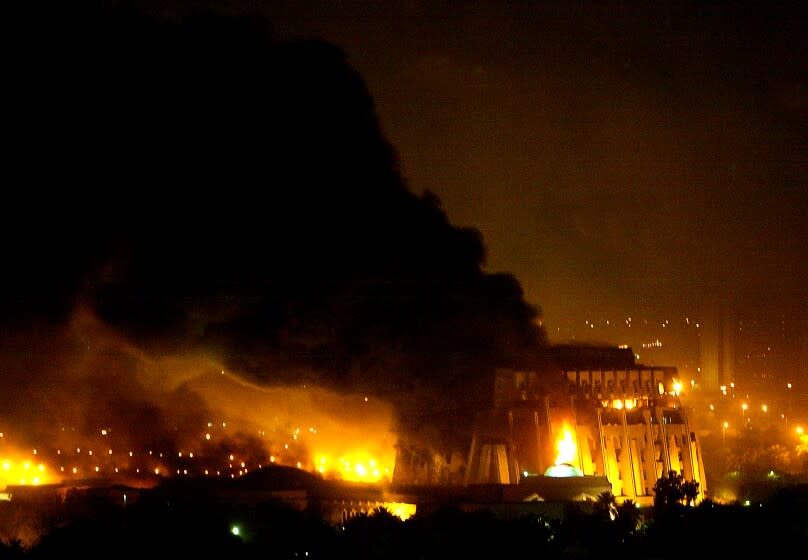Op-Ed: America didn't take a 'holiday from history.' Unfortunately

- Oops!Something went wrong.Please try again later.
- Oops!Something went wrong.Please try again later.
- Oops!Something went wrong.Please try again later.
- Oops!Something went wrong.Please try again later.
A week after the Russian army made its move into Ukraine, former Defense Secretary Robert Gates wrote, “Vladimir Putin’s invasion ... has ended Americans’ 30-year holiday from history.” According to Gates, the Russo-Ukrainian war should serve as a wake-up call, prompting the United States to get off the couch and back to work. Other proponents of a global Pax Americana agree. But the argument is both misguided and dangerous.
In fact, over the last 30 years, America has seized history by the collar, demanding its compliance with dictates issued from Washington. But time and again history has refused to oblige.
In December 1989, at the very outset of America’s supposed holiday from history, U.S. forces invaded Panama to overthrow the existing government and replace it with something more agreeable to Washington. For then-President George H.W. Bush, regime change in Panama was a first step in creating what he subsequently called a “new world order.”
Bill Clinton, who succeeded Bush in 1993, concurred. Speaking to the United Nations General Assembly that same year, he announced that “a turning point in human history” was at hand. That turning point offered an opportunity for the United States to serve “as a fulcrum for change and a pivot point for peace.”
Clinton’s own successor was even more forthright in specifying America’s purpose. Speaking after 9/11 — another event said to disrupt a “holiday from history” — and the 2003 invasion of Iraq, George W. Bush cited “the advance of freedom [as] the calling of our time.” Waging a global war on terror would enable the United States to fulfill that calling. Liberty defines “the direction of history,” Bush declared, with American-style freedom “the right and the capacity of all mankind.”
This was not the language of a nation embarking on an extended holiday. Nor was it simply idle rhetoric.
For the United States military, the post-Cold War era hasn't been a timeout but a period of intense activism and armed interventions. Panama, Somalia, Bosnia, Kosovo, Afghanistan, Iraq, Libya, Syria. U.S. troops also fought against a variety of terrorist groups, usually with inconclusive results. Along with Al Qaeda and its various “franchises,” adversaries included Islamic State, Al Shabab, Abu Sayyaf and Boko Haram.
The cumulative financial costs of policing the post-Cold War Pax Americana presently exceed $8 trillion, according to Brown University’s Costs of War project. The scope of the overall U.S. military effort has been extraordinary. An investigation by the nonprofit organization Airwars concluded that just since 2001, for example, U.S. forces have conducted more than 91,000 airstrikes resulting in 22,000 to 48,000 civilian deaths. Nor have American casualties been inconsequential, with more than 7,000 U.S. military fatalities and more than 53,000 U.S. troops wounded, many grievously. Veteran suicides and the incidence of post-traumatic stress disorder have reached troubling levels.
So if the U.S. went on sabbatical after the Cold War, the troops never got the word.
Meanwhile, the national security apparatus continues on autopilot. Thousands of soldiers, sailors, Marines and airmen annually rotate among the several hundred U.S. military bases in more than 80 nations around the world, even as NATO enlargement increased by 14 the number of countries they are expected to defend. Pentagon spending trends ever upward. This year, Congress appropriated billions more than the White House requested.
As the world’s leading arms merchant, the United States continues each year to sell or give away billions in advanced weaponry, much to the delight of arms manufacturers. Ongoing efforts to modernize the U.S. nuclear strike force, to the tune of an estimated $2 trillion, offer more evidence that the United States has not left on an extended vacation.
Why has history in recent decades proved to be impervious to Washington’s energetic exertions? Rather than inaction or passivity, that problem reflects a pattern of American arrogance and folly. With a recklessness that at times has rivaled Putin’s, policymakers in Washington have misread the signs of the times, squandering American power while giving short shrift to problems at home and abroad — the climate crisis offering one example — that demand urgent attention. The evidence is overwhelming: Gates and other members of the political elite have massively misconstrued history’s purposes and American capabilities.
In his riveting presentation to Congress last week, Ukrainian President Volodymyr Zelensky remarked that “being the leader of the world means to be the leader of peace.” Becoming a leader of peace will require the United States to audit the errors to which the Pax Americana has given birth. A different course is in order, one centered on prudence, restraint and modesty about what liberty entails or requires.
Andrew Bacevich is president of the Quincy Institute for Responsible Statecraft.
This story originally appeared in Los Angeles Times.

